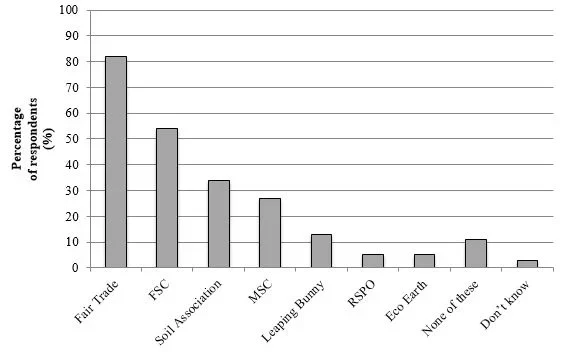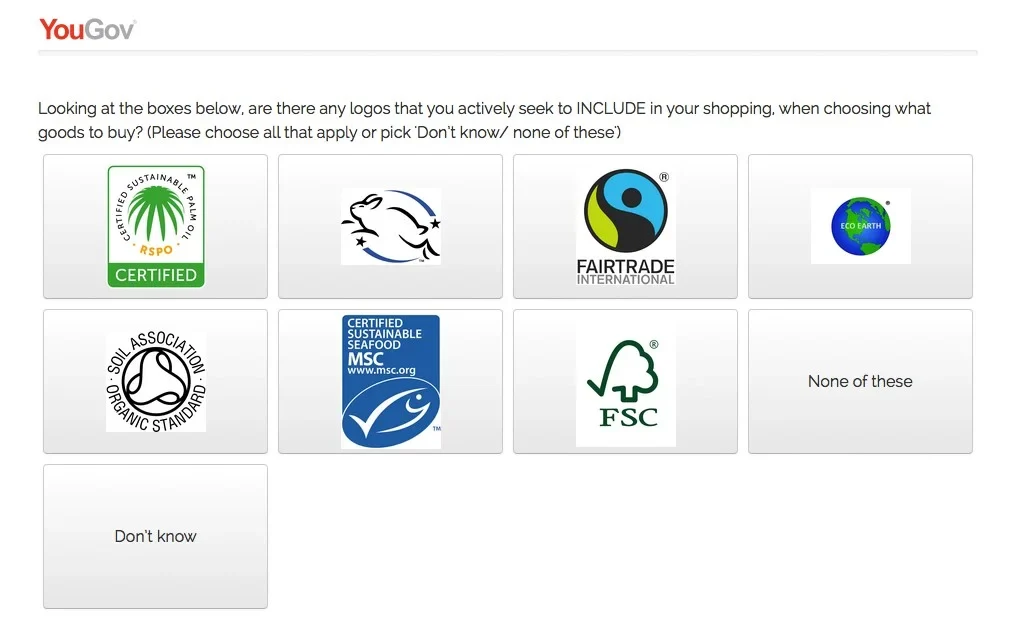Eco-labelling may work in principle. But is Fairtrade an exception that proves the rule?
When was the last time you bought palm oil? Likely never on purpose. But there’s a high chance you buy it every time you shop for groceries.
As a highly versatile conditioning agent, it is the world's most commonly used vegetable oil and contained within roughly half of all packaged products in the supermarket, according to the World Wide Fund for Nature (WWF). In 2016, for example, over 20 times more palm oil was produced than olive oil. While an important source of agricultural income and economic growth - particularly in Malaysia and Indonesia, which account for approximately 85% of production - the palm oil industry is also charged with wreaking significant environmental and social impact, such as deforestation, biodiversity loss and population displacement.
Consequently, an association of industry and NGO members has been working together since 2004 under the auspices of a ‘Roundtable on Sustainable Palm Oil’ (RSPO) to improve the social and environmental sustainability of palm oil production.
This includes an RSPO trademark label, which can be included on packaging to certify that retail items only contain a ‘certified sustainable’ form of palm oil, duly produced according to certain sustainable criteria, such as avoiding the destruction of primary forest to make way for palm oil plantations.
As a Cambridge doctoral researcher, Rosemary Ostfeld (reporting here) teamed up last year with the YouGov-Cambridge Centre to explore several aspects of her research, namely consumer awareness of palm oil, recognition of eco labels and willingness to pay in theory for environmentally friendly products in the supermarket, including RSPO-certified items.
For cheerleaders of sustainable palm oil, the results yield a mix of good and bad news.
Respondents were shown a list of vegetable oils and asked which they had heard of, including palm oil and a non-existent ‘beetroot oil’. General awareness of palm oil was high at 77%, while only 5% claimed to recognise the fictitious beetroot oil.
Which, if any, of the following types of oil have you heard of? (Please tick all that apply)
| Type of oil | % |
|---|---|
Sunflower oil | 95 |
Olive oil | 95 |
Rapeseed oil | 89 |
Palm oil | 77 |
Soybean oil | 35 |
Beetroot oil | 5 |
None of these | 1 |
Don't know | 1 |
Of those who recognised palm oil, however, fewer than half (41%) thought it was produced in environmentally unfriendly ways, compared with 12% who thought its production was generally 'friendly' to the environment, while a large proportion opted for 'Don't know" (43%).
Respondents were also presented with a variety of common eco labels, including Fairtrade, Marine Stewardship Council, Forest Stewardship Council, Soil Association, Leaping Bunny, RSPO, as well as a fictitious label called 'Eco Earth', and asked to say which they recognized.
Which, if any, of the following logos do you recognize?
As findings show above, consumer recognition of the RSPO eco label was virtually non-existent, showing the same level of recognition as the fictitious 'Eco Earth'.

Respondents were further shown those labels they claimed to recognise and asked in turn if they actively sought to include and avoid any when shopping.

As the most recognised label by far (82%), Fairtrade recieved the strongest vote of consumer confidence - perhaps unsurprisingly - with nearly a third of respondents (29%) saying they actively sought to include it in their shopping.
However, a majority of respondents overall (53%) still chose 'none' as their answer. and most other labels got a meagre showing in the respondents' shopping baskets.
Are there any logos that you actively seek to INCLUDE in your shopping, when choosing what goods to buy?
| Type of label | % |
|---|---|
Fairtrade | 29 |
MSC | 10 |
FSC | 9 |
Soil Association | 7 |
Leaping Bunny | 5 |
RSPO | 1 |
Eco Earth | 1 |
None of these | 53 |
Don't know | 11 |
In other words, palm oil may be omnipresent to modern life. But consumer awareness of its impact and responsiveness to numerous types of eco-labelling seems much more scarce.
In the nearly forty years since eco-labelling began, the Fairtrade movement has enjoyed notable success, suggesting that eco-labelling can work in principle as a tool for shaping green consumerism and sustainable behaviour.
As these results suggest, however, the RSPO and other eco-labelling initiatives still have a mountain to climb in raising public awareness, at least where British consumers are concerned.
Methodology: Fieldwork was conducted online between 2-3 March, 2016, with a total sample of 1695 British adults. The data have been weighted and results are representative of all British adults aged 18 or over.









